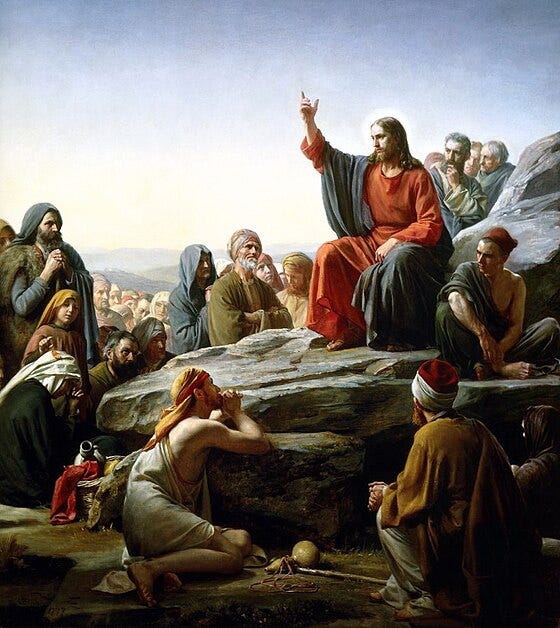Blessed Are
Introducing: A mini-comic series bringing the Beatitudes to life in a modern day context, with a note from the illustrator, Matthew Vincent.

The Beatitudes: Let Salt and Light Be Our Attitude
“You are the salt of the earth. But if the salt loses its saltiness, how can it be made salty again? It is no longer good for anything, except to be thrown out and trampled underfoot.
“You are the light of the world. A town built on a hill cannot be hidden. Neither do people light a lamp and put it under a bowl. Instead they put it on its stand, and it gives light to everyone in the house. In the same way, let your light shine before others, that they may see your good deeds and glorify your Father in heaven.
- Matthew 5:13-16
One of the first teachings I can remember on salt and light was given by the British theologian John Stott in a lecture at Trinity Seminary in Ambridge, PA in which he challenged Christians to “not remain in the salt shaker.”
Salt's purpose, he explained, is to be rubbed into meat to preserve it and enhance its flavor, rather than draw attention to itself.
What happens when meat is left unsalted? It inevitably spoils. You can’t blame the meat for doing what it will naturally do, but you can blame the salt for staying in the shaker.
Similarly, Stott pointed out, darkness is merely the absence of light. You can’t blame the dark for being what it is, but you can blame the light if it remains hidden under a bushel.




Bottom line, when the church withdraws from the institutions which shape society, often creating alternative ones, we should not blame the culture for rotting, we should blame ourselves for staying in holy huddles.
As Martin Luther king said,
“Darkness cannot drive out darkness, only light can do that. Hate cannot drive out hate, only love can do that."
I’ve used this salt and light teaching for decades as a foundation for a calling to public life and public theology.
It wasn’t until I held hands with a diverse group of believers in the Sistine Chapel—including the singer Marcus Mumford and Pete Docter, the head of Pixar—and read aloud together the Beatitudes that I truly realized salt and light images are not merely informing a strategy for social and cultural renewal. The Beatitudes are embodied in fully Jesus, and radically show us how to live as salt and light daily to advance His kingdom.
God told Abraham that he would be a light unto the nations (Isaiah 49:6). Jesus told his followers that He was the light of the world (John 8:12). Jesus then told us that we are to walk as children of the light (Ephesians 5:8).
When the Israelites were in the promised land, their purpose was clear: to be undefiled, set apart, and fully integrated as both people and a nation-a chosen people of God. However, like all people, they were never able to live up to these demands. As we explored in Believing in Babylon, God’s people often had to learn to live faithfully outside the constructs of their own nation. But for the Israelites, their national kingdom was God’s, and God's earthly kings were their leaders.
In contrast, Jesus said His kingdom is not of this world, and that his followers would, like him, be rejected by it. Even more radically, Jesus said that his kingdom was like a mustard seed, a pearl of inestimable worth, a lost coin. It is real but unseen, a hidden treasure, all powerful but seemingly powerless, persecuted but triumphant. It is an “upside down” Kingdom, most fully captured in Scripture through the Sermon on the Mount.
I am convinced the beatitudes are the key to understanding how we are sent as salt and light. In His sermon Jesus lays out a series of counterintuitive propositions which challenge us to the core. What makes us “salty”? How are we to fulfill salt’s purpose, to both preserve and enhance? By living out the Beatitudes. They are a reflection of Jesus’ character. When we live the Beatitudes, we reflect his light to the world.
As Jesus entered the world, “the Word became flesh and dwelt among us, and we have seen his glory, glory as of the only Son from the Father, full of grace and truth.” As the father sent Jesus, so Jesus sent out his 12 disciples, and 72 appointed others. Jesus later prayed “As the Father has sent me, even so I am sending you.”
We who follow Jesus have also received a radical call that we can’t fully live up to, but now, we have the Holy Spirit indwelling each of us to empower and guide us to become more and more a reflection of Jesus. How we live out this call in our family, friend group, community, culture, nation and world is personally discerned but not without consequence. The more we live out the Beatitudes the more we reflect Jesus and the more we advance His Kingdom.
We created Salt and Light Stories to be an exegesis of the Scriptures in the way that Jesus often taught – through stories. Told through the lives of men and women who have lived faithfully in their cultural contexts, we are presenting “salty” stories that reflect His light. We’ve told these stories through the graphic novel format as a medium that resonates with Gen Z, with the hope that these stories would engage the next generations.


For this series on the Beatitudes,we invited Gen Zers to collaborate and bring these stories to life in a context that is relevant to their generation. Clapham Group staff members Emily Fuller and
, alongside author , worked together to uncover and shape modern examples that illustrate the beatitudes woven into the fabric of daily life. While there are endless stories that could illuminate these truths, we chose those in which the average reader might see themselves—stories that invite us to embody the beatitudes in the simple, everyday moments of our lives. The beauty of the beatitudes lies in their quiet power: they don’t call us to grand gestures, but to a way of being that transforms the ordinary into something profoundly meaningful.The upside down kingdom will grow, but not in the ways those who look to political power or prestige may expect it to. The gates of hell will not prevail. God can use us to advance his kingdom, but it starts by understanding that it’s not about the tactics of cultural engagement. It is how we each live out His challenge in the Sermon on the Mount, to “taste” and look like the beatitudes.
God’s kingdom WILL grow. We will not make disciples through power, but through a daily embodiment of Jesus, allowing others to taste and see Christ in us.
- Mark Rodgers









Amen! Super excited for the series. :)